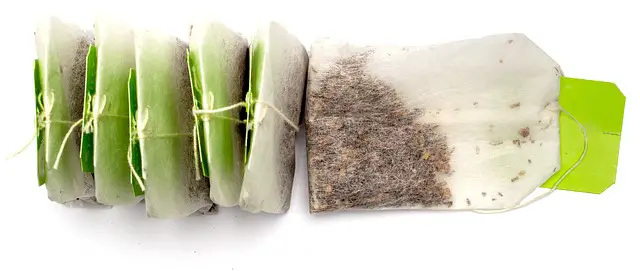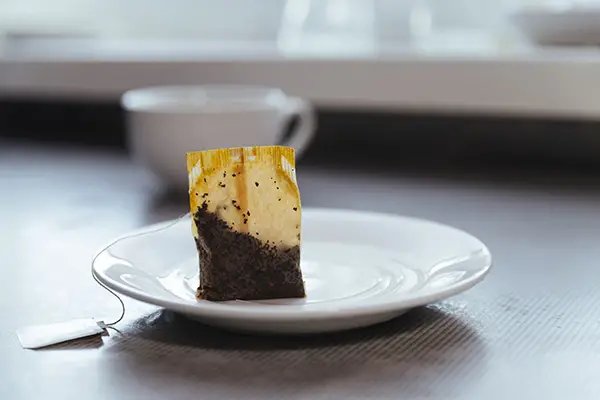
As most tea bags contain plastics, they can’t be composted. The tea leaves can be used, though.
I’m an avid gardener and like to recycle as many components in my kitchen as possible. This is why I did my research on composting tea bags. There was a lot more to the topic than I realized!
In this post, I will show you why tea bags aren’t compostable, but how you can use tea leaves in your garden, and lots more!
Contents
The short answer to this question would be: No.
At least, not yet, anyway.
This is because most tea bags contain at least some plastic in them.
Certain premium bags use nylon or PET plastic. These most definitely can’t be used during composting.
Even tea bags that are largely made up of natural materials still contain a small amount of plastic.
Most companies use plastic to seal their teabags.
Due to this, many tea bags aren’t suitable for composting.
It is just as important to know if tea leaves can be used as a fertilizer.
Well, the answer here is pretty straightforward – you absolutely can.
Both fresh and used tea leaves contain tannic acid and nutrients that can improve soil quality.
It should be noted that not all plants will respond well to soil enriched with tea.
This is because tea leaves can decrease the pH of the soil, making it more acidic.
Thus, you should only use tea leaves for plants that can be grown in acidic soil. Don’t use it for plants that require alkaline or neutral soils.

If your tea bags are plastic-free and compostable, then they can be directly added to your garden.
Once the tea bags have been used for steeping, allow them to cool.
Find the plants that are most likely to benefit from the acidity provided by the tea leaves. These leaves can also help with moisture retention and weed suppression as well.
Then, it is simply a matter of planting the tea bags near the root system.
Start with just one teabag, especially if you are placing them near a smaller plant.
Related Articles
All You Need to Know About Tea for Beginners
Some brands have scrambled to find alternatives for the plastic currently used in tea bags.
In doing so, they have reached out to biodegradable plastics.
So, can these tea bags be composed? No, they can’t.
There is a difference between biodegradable and compostable.
Biodegradable plastic items contain microorganisms that cause the plastic to break down.
At the end of the day, though, most experts would classify them as plastics.
As such, they have no business being in your garden.
Compostable items, on the other hand, are ones that are made from natural – often plant-based – sources.
These can be broken down into essential components and provide an advantage for your garden.
Thus, just because a tea brand claims that its tea bags are biodegradable doesn’t mean that it is compostable.
Needless to say, if you do want to use your tea bags for composing, you need to find a plastic-free brand.
Here are the most popular tea manufacturers and brands. Let’s see how they hold up:
It is very difficult to get answers about Lipton’s teabags.
The only real information available regarding these is that the Lipton Black and Intense bags are made from Manilla hemp and cellulose.
However, there aren’t any supporting details to show that the tea bags are compostable.
According to the company statement, Twinings will ensure that all their tea bags will be made from a new type of paper that is biodegradable.
However, Twinings does make the distinction that these bags will degrade only in “local authority composting”.
The company states that it is still trying to come up with a teabag material that will decompose in a home compost.
Teavana tea bags do fall under the premium label mentioned previously.
Due to these, the tea bags are made from nylon.
This means that they aren’t biodegradable or compostable.
There is some evidence to show that Celestial Seasonings are conducting trials to create plastic-free and hopefully compostable tea bags.
At this time, however, the company still uses a small amount of food-grade polypropylene fibers to heat-seal their teabags.
Bigelow does mention that its tea bags are made from sustainably resourced paper.
They mention that the teabag packaging which is made from the same paper is recyclable and biodegradable.
Nonetheless, the company doesn’t state that its tea bags can decompose or be composted specifically.

As you can see, there is quite a bit of confusion surrounding which popular tea brands do or don’t contain plastic.
This is often because brands that do rely on even a small amount of plastic in their tea bags are hesitant to mention it.
So, how can you which brand to choose? Here are some tips:
The easiest option for you is to educate yourself on the top plastic-free brands. They are as follows:
Keep in mind that just because a brand may offer biodegradable tea bags, doesn’t mean that these bags are compostable.
This is because some bags can take longer to decompose than others. Thus, you will need to drop these tea bags off in local composting plants.
If you aren’t willing to switch brands or require greater clarification, your best option is to reach out to these tea brands.
Email them a list of pointed questions regarding what is used in their teabags.
If you aren’t happy with the replies, don’t hesitate to contact them again.
As a consumer, it is your right to know exactly what you are using.
So, there you have it, all that you need to know about composting tea bags. Once you get your hands on compostable tea bags, it is simply a matter of adding them to your garden and watching your plants flourish.
If you would like to learn more about tea bags and what you can do with them, check out our Pinterest page for more posts.
